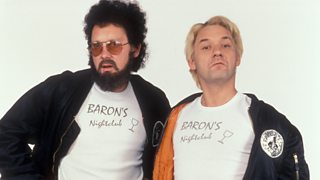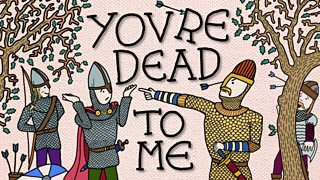The Joy Of Stupid Names

By Joel Morris
Billions of years ago, straight out of school, when my professional other half Jason Hazeley and I started writing comedy professionally, one of the first notes we got from an experienced and sensible script editor was that we had used too many stupid names. We took all the other advice and ignored that note. We stick to that principle to this day. If you are trying to get a laugh, you simply cannot have too many stupid names.
Agendum, our Radio 4 current affairs parody, is inspired by a serious desire to express our frustration with the collapsing standards of public debate. But along the way, that doesn’t mean we can’t just have fun making up lots of stupid names. We’re proud of the points we hopefully land about false equivalence, journalistic cliché, clickbait, tweetstorms and rent-a-gob controversialists, but we also take unabashed pleasure in names like ‘Anoushka Baboushka’, ‘Jonathan Travoltathon’ and ‘Myfanwy Magnet’.
Names are powerful things. Comedy, we often insist over a pint, is music. It’s all about rhythm, tone, reference, repetition, pattern, counterpoint, expectation, subversion, tension and release. Names are wonderful tools for a comedy writer because your basic tool is surprise, and the space where a name occurs in a sentence can accommodate anything at all.

Where the listener or reader expects a name, the brain pauses, and you can slide whatever you like into that gap. A name is a rest in the bar that can accommodate a joyous linguistic paradiddle, or a startling blare of verbal brass, or a little starburst of syllables. Sometimes you drop in sounds for their own sake, abstract like free jazz. Sometimes you go for a deliberate verbal echo, crafted to get a reaction. Anything goes.
Dickens and Shakespeare used carefully whittled names - Andrew Aguecheek, Wackford Squeers - to give clues to character. The same skill gives so much texture to the worlds of George R.R. Martin and J.K. Rowling. The names of Tirion Lannister, Joffrey Baratheon, Rubeus Hagrid and Albus Dumbledore are simply pleasurable to roll fruitily around the mouth. The joy of those syllables sometimes disguises what might otherwise be howling spoilers. The name ‘Remus Lupin’, in Harry Potter, for example, is so enjoyably sonorous that plenty of readers never notice the character is named after a Roman boy raised by a she-wolf and the Latin word for wolf, and the reveal of the character’s werewolf identity somehow still manages to come as a surprise.
Resonant syllables that hint at what to expect can be a huge aid to comedy. We often laugh because we have expectations of behaviour, which a comic character can confirm or confound for our delight. If there are already clues in the syllables of a character’s name - are they grand or humble, soft or spiky - we know them a little from the moment we meet them. You don’t need to see a picture of Augustus Gloop to know which one’s the greedy kid in the chocolate factory.
Where the listener or reader expects a name, the brain pauses, and you can slide whatever you like into that gap.
We keep notebooks of happy combinations of sounds we hear or see around us, in case they can be used for names. Sometimes smashing a famous first name into a similarly unmistakable surname seems to get good results (Busta Nimoy, Sugar Ray Wonka, Sigourney Beefheart, Jabba De Botton). Surnames made of words too modern to have evolved into surnames have a natural preposterousness (‘Dame Annabel Googlewhack’) and flat or mundane words can be rendered hilarious by turning them unexpectedly into names - think of Father Ted’s immortal lothario milkman Pat Mustard. In the 17th Century, there was a fad for naming children after a random word from the Bible, hence Accepted Frewen, president of Magdalen College, who had a brother called Thankful. Venerable Mayflower pilgrim William Brewster ended up with children called Patience, Fear, Love and - best of all - Wrestling.
In Agendum, we have free rein to name our reporters whatever we like (puns, silly sounds, Dr Seuss-ish gibberish) because they have one job to do - present a news item. The audience knows what to expect, and the name can’t dent that. But when we get to the partly improvised studio debates, it’s helpful to let the audience know who’s on what side of the argument. Choosing the right daft name can help reveal class, regional background, upbringing, attitude. An appearance-fee controversialist called ‘Yap Claven’ is already annoying before he’s opened his mouth.
Sometimes a bland name can itself be revealing of character; maybe this person is meant to be an everyperson, that we enjoy recognizing ourselves in, rather than an eccentric other. That’s when you start employing ‘normal’ names that can, in themselves, be so normal they become funny. Vic Reeves and Bob Mortimer adore using names like ‘Chris Bell’, ‘Pat Wright’ and ‘George Dawes’, because the down-to-earth names provide delicious contrast to their unhinged characters.

These things ebb and flow with fashion. The outlandish characters of Monty Python, unlike Vic and Bob’s, had names like ‘Mr Spare-button-supplied-with-the-shirt’ and ‘Mrs Elizabeth III’ as a way of expressing the group’s glee at liberation from editorial interference - anything goes - and as a nod to their heroes Spike Milligan, Barry Took and Marty Feldman, who had similarly expressed the sheer joy of creativity by typing whatever the hell they liked onto the page when a character name turned up, sometimes concealing obscenities that would otherwise have been blue pencilled.
Our biggest influences always played with names. Fry and Laurie would write whole sketches based on the mere sound of names, ‘Suckmaster Burstingfoam’, ‘Ottoman Nodge’. They even came up with a character whose name is the sound of a cigarette lighter being dropped on a desk. And the cerebral news satire of On The Hour, The Day Today and Brass Eye delighted in names either told you everything - the bland acceptability of ‘Alan Partridge’ - or exploded in a tonally appropriate cloud of gleeful contempt for the gibbering tick-tock rhythms of news half-heard - ‘Peter O'Hanraha-hanrahan’ or ‘Sarah Sampson Superchrist’.
Names are a place where the sheer joy of language for its own sake can be expressed. It’s writing in its purest form. Every part of every word can be weighed and played with. You can reveal character, give clues to plot, or you can just get laughs for free.
Here’s to J. Peasmold Gruntfuttock, ‘Catsmeat’ Potter Purbright and Raymond Luxury-Yacht.
‘Agendum’ by Jason Hazeley & Joel Morris is available on 大象传媒 iPlayer Radio.
They also present ‘Rule of Three’, a podcast about the craft of comedy, available through the usual outlets.




